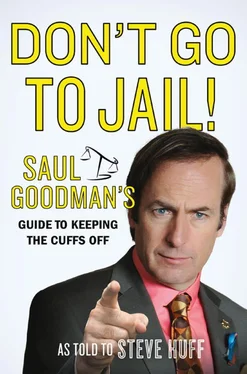Kevin appealed the computer restrictions, and they were lifted. He made good on his promise to make good—he took what he knew about computer security and started his own consulting company specializing in analyzing big systems owned by major businesses all over the country. Nowadays he shows up on the news occasionally, but not for any current misdeeds. He discusses cyber crime if some crazed hackers take over a bank, lift unassuming shoppers’ credit card numbers, or dump their targets’ private information on the Web for all the world to see.
* * *
All this to say: sometimes “going straight” (living a life free of any questionable activities that might necessitate the services of fine counselors like yours truly) doesn’t require as many adjustments as you might think.
Sure, that’s qualified—crimes that have to do with abusing substances, for example, kind of carry an inherent demand the persons convicted do something about their unpleasant dependencies. But! There are criminal pursuits that require skills you can modify to use to your, and society’s, advantage.
Imagine a woman arrested for cheating a casino. She had some kind of system—collusion, card marking, maybe even counting—that allowed her to rack up a rainbow of ill-gotten chips. No matter how she did it, she found a way to evade the casino’s security protocols much longer than previous card sharks, so catching her was just pure dumb luck.
Casino owners will be interested in how this woman pulled it off. Sure, they could probably figure it out by combing through whatever investigative documents are created by the detectives on the case, or they can simply cut through the pantomime and approach the hustler directly to say, “Hey, tell us what you did here.” I’m not saying you should break the magician’s code, Valentino, but maybe if the opportunity presents itself, it’s time to lay a few of your cards on the table.
Now let me tell you about a former client of mine, Slim Jim. He was a pro with a crowbar, boosting cars left and right for midnight joyrides. He’d fence the stereos, nab the plates, then ditch the wheels in the parking lot of the closest Blake’s Lotaburger. Slim was in no position to take I-40 straight to Hollywood and make it big like Georgie, but you know what he did to turn his temptation into an honest trade? He became a taxi driver. Now he gets to pick things up and put them right back down someplace else all day long, and if someone’s running late for a flight to their daughter’s wedding, well, they certainly don’t mind if he puts a little extra weight on the accelerator pedal.
So, what’s tempting to you? Easy money? That tempts everyone, get in line! Washing your problems away with a sweet swig of Kentucky bourbon? Not having to worry about taxes and paperwork and qualifying for a mortgage? Congratulations, then: you’re a human with a heartbeat and mortal temptations.
Sometimes that’s all “criminal activity” really is—someone giving in to the most basic human hungers. That doesn’t excuse breaking the law, but it does make a difference on the inside. Screwing up can be a vicious cycle of giving in to your most base desires, realizing what you’ve done, hating yourself for it—then feeling gutted by the hate and screwing up again. And like these folks I just told you about, you, too, can (and should!) identify your skills and use them to your advantage.
Maybe you’ve been convicted, for example, of some kind of con game that involves being really good at persuasion. That’s a very special skill, one that works outside of crime, sometimes brilliantly. You can smoothly talk someone out of their hard-earned money doing a kind of bait and switch? I’d bet you’d kick ass at selling cars. Or selling anything.
Summation
It all comes down to one phrase: “Don’t give up.” Facing a legal snafu can do a real number on you, and make you feel like waving the white flag. Cops and prosecutors trying to put you away; your reputation and your livelihood on the line—this is how spirits get broken and families fall apart. But: hang in there, baby!
When the going gets rough, that’s when whatever “special skills” you’ve used to get you where you are might work in your favor and help you survive. Even if you receive a not-guilty verdict, the road ahead can look like it’s got more shitty hairpin turns than you’d find twisted up in your small intestine.
Sometimes, an acquittal can be even better for your fate than not getting in trouble in the first place. What the hell were you up to when the accusation came your way, anyway? Even if you were totally on the up and up, and the allegations of criminal behavior were completely unwarranted, what you face now is— voilà! —a chance to change, be a better you, all that jazz. And the slow path to self-improvement is a lot more pleasant than the fast track to lockup.
You Must Change Your Life
I’ve talked about planning—about putting contingencies in place. This is all between your attorney and you, discussed in-office or in whispers in court when you can get away with it.
These conversations are all “before.” It’s only natural to wonder about the “after.” When you’re in the middle of a trial, it’s like you’re clinging to flotsam and ice floes right off the sinking Titanic . You’re happy to be alive and above water, but somewhere in the back of your soggy cerebellum you’ve got to be thinking, “The ship’s long gone… what’s the plan now?” Everything that follows, whether you win or lose your case, is the “after” and it needs some love, too. How we manage the “after” has a heck of a lot to do with whether a client ends up a repeat customer or not. Hey, I want to see you again, of course! But first you can do a little solo legwork to restore yourself once the ordeal of court is over.
And if you lose your case, that doesn’t mean you’re done. We’ve talked about how to make the best of your potential time behind bars, but most clients—even the toughest meatheads in the joint—still have something on the outside that keeps their hearts ticking and encourages them to continue drawing big, fat Xs on the calendar days to mark their time.
If even Big Bubba is angling at how to get his affairs in order on the outside, I know for sure that you will be, too.
* * *
Unfortunately, just having a sharp new suit or Liberace feather boa or whatever your flavor laid out all nice and ironed when you strip off that prison jumpsuit probably isn’t going to be the only big fix you need to put your life back on track again. We know there’s much more to it than that, but I can use that as a symbol.
Whatever position you’re in, once it’s all over—the trial itself, the sentence after the trial—it’s over and that’s awesome. We start in the black again, right?
When you get out, your perspective is going to be different. It’s like what people say about near-death experiences—you come out to see the grass grows greener, the cinnamon buns smell sweeter, the chili tastes spicier, and the ocean breeze feels just a bit breezier.
If you’ve been in lockup it might be easy— really easy—to walk out into the world with a grade-A chip on your shoulder. Many people do. They end up back in my office, too, because that anger is jet fuel for a big term: “recidivism.” It sounds like something that involves a high fever and brings out boils on your skin, but it’s just a fancy word for “relapse.”
Energy can’t be created or destroyed; it’s science! For these aforementioned ladies and gents all that anger they’re carrying needs someplace to go, so they might find themselves taking it out on someone. That can happen even if the case is won, since trials are so stressful.
Читать дальше












